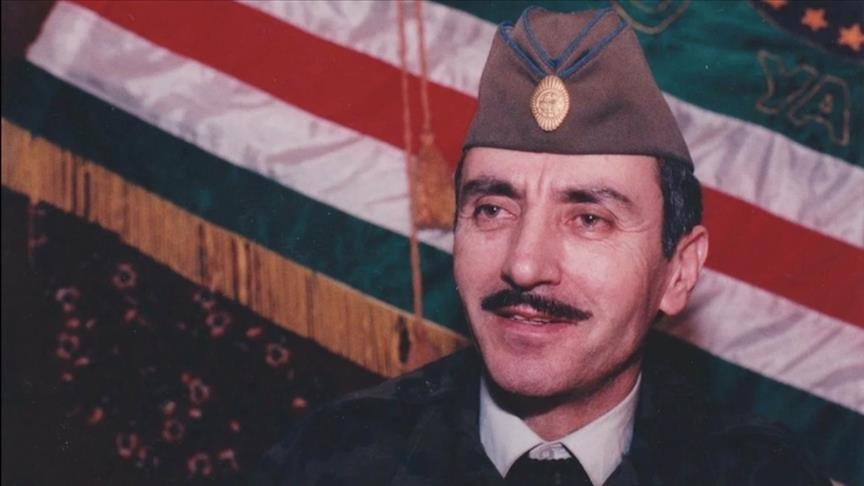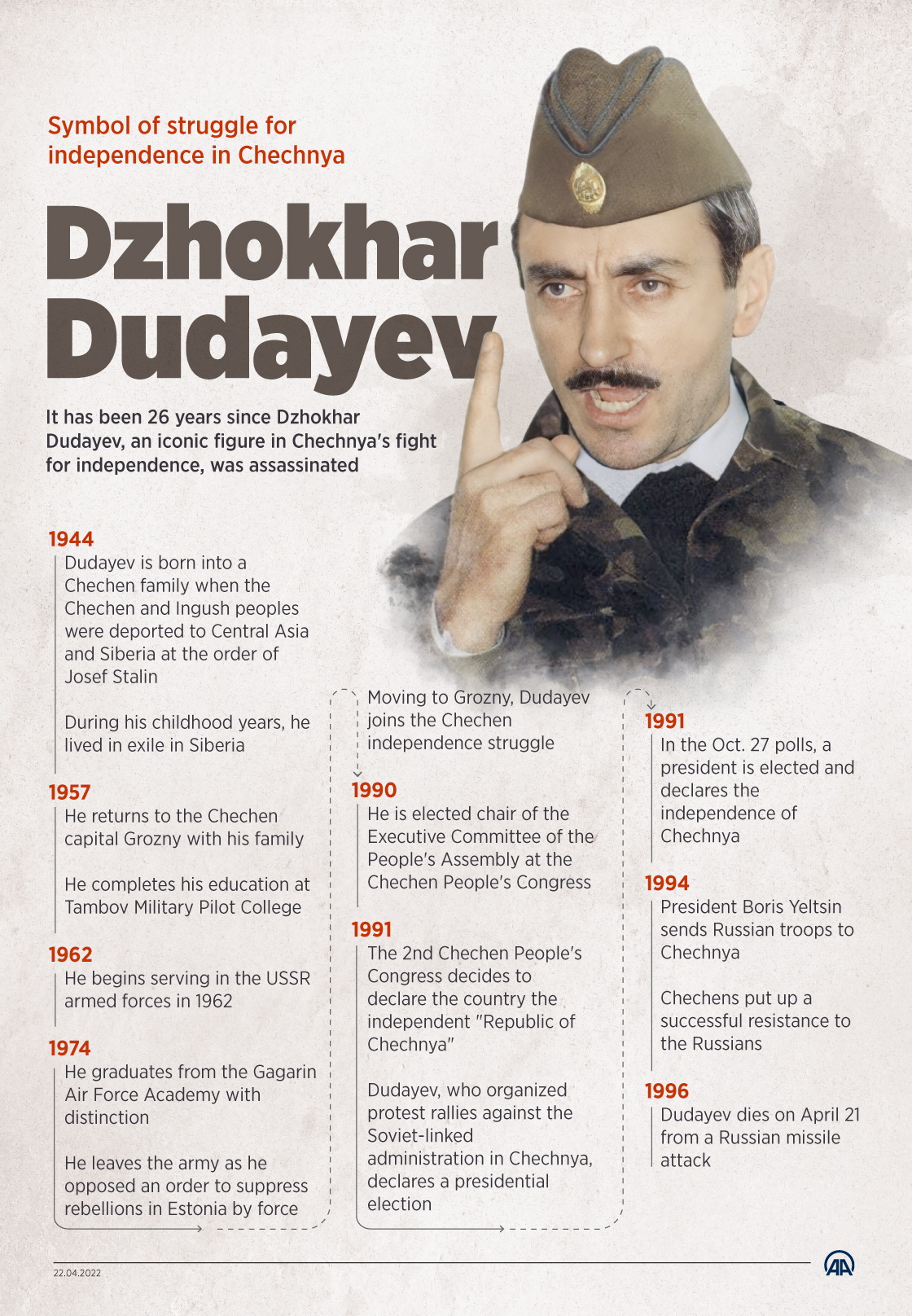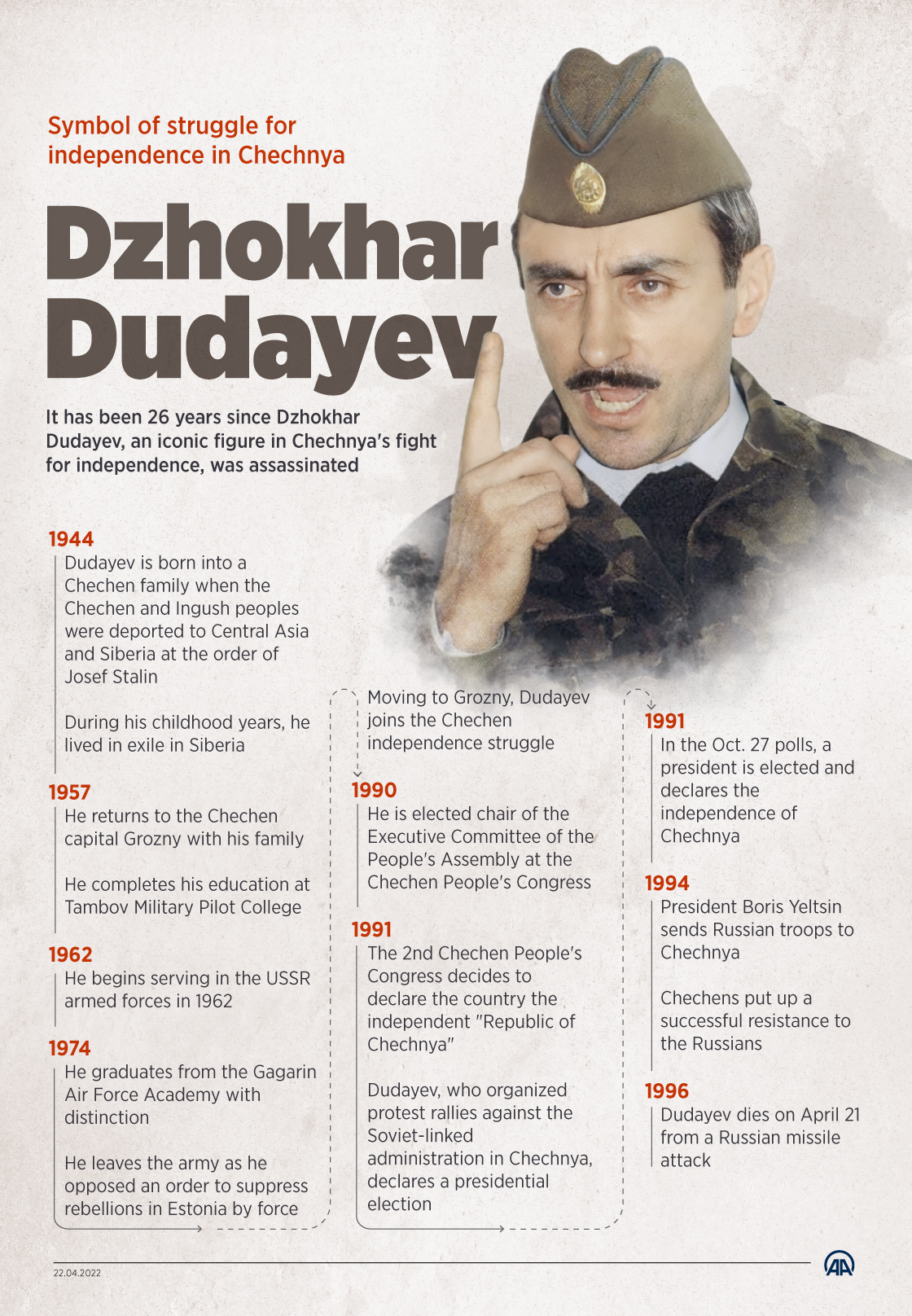
ANKARA
It has been 26 years since Dzhokhar Dudayev, an iconic figure in Chechnya’s fight for independence, was assassinated.
Dudayev, who led the Chechens' fight for independence after the collapse of the Soviet Union, was born into a Chechen family in 1944 when the Chechen and Ingush peoples were deported to Central Asia and Siberia at the order of Josef Stalin.
Dudayev, who spent his childhood years in exile in Siberia, returned to Grozny with his family.
Dudayev entered the Faculty of Physics and Mathematics at North Ossetia State University. But after his freshman year, he secretly took training courses for military piloting in Tambov, Russia, from his mother and then completed his education at the Tambov Military Pilot College.
Dudayev, who started serving in the USSR armed forces in 1962, graduated from the Gagarin Air Force Academy with distinction in 1974.
Talented army officer
Warplane pilot Dudayev, who received many medals for his achievements in the Soviet army, made a name for himself as a well-trained and talented officer in the army.
During the disintegration of the USSR, independence movements emerged in the countries within the union. Revolts began in the Baltic states to declare their independence.
Soviet authorities instructed Dudayev, who was serving in Estonia, to suppress the riots by force. However, Dudayev opposed this directive, saying that he would not drop bombs on people fighting for independence.
Later, Dudayev left the army and went to Grozny and took part in the independence struggle of Chechnya.
He was elected head of the Executive Committee of the All-National Congress of the Chechen People in 1990.
The following year, a group within the state attempted a coup in Moscow to take power from the Soviet Union's leader, Mikhail Gorbachev.
Although the failed coup attempt lasted three days, this action became the source of great troubles within the Soviet Union.
Dudayev led the popular movement against the Chechen-Ingush Autonomous Soviet Socialist Republic, which was collaborating with the putschists at that time.
At the second Chechen People's Congress convened in the same year, it was decided to declare the country as the independent Republic of Chechnya.
An interim government was announced at the congress and it was decided that Dudayev, who was elected chairman of the executive committee, would take over. Dudayev established a parallel administration to the Chechen-Ingush Republic.
Dudayev, who organized rallies against the Soviet-linked administration in Chechnya after the coup attempt in Moscow, declared a presidential election in the country.
1st president of independent Chechnya
After being elected president in the election held on Oct. 27, the first act of Dudayev was to declare Chechnya's independence.
Despite the coup attempt in Moscow, Mikhail Gorbachev, general secretary of the Communist Party of the Soviet Union, did not give the administration to the junta, but later resigned from the Party General Secretariat.
Boris Yeltsin, the president of Russia, who opposed the coup, took over the administration. Yeltsin signed the decision to dissolve the USSR.
Yeltsin reacted to President Dudayev by not recognizing Chechnya’s independence decision.
Dudayev, who was preparing against a possible Russian attack by collecting weapons left by the Soviets, tried to establish political contact with Moscow. In response to Dudayev's efforts in this direction, Yeltsin sent Russian troops to Chechnya in December 1994.

Resistance
Although the Russian army moved with the plan to take Grozny in two hours, the Chechen-Russian war lasted for months.
The Russian army carried out airstrikes in places where civilians lived. The Russian army, which was stronger than the Chechens in terms of the number of soldiers and weaponry, encountered great resistance in Grozny. Chechens did not surrender the city to the Russians for a while, despite having limited resources.
However, to prevent further destruction of the city by bombs, the Chechens retreated to the mountains and started to use guerrilla tactics. This tactic of the Chechens, who attacked the Russian headquarters in the city and retreated to the mountains, inflicted great casualties on the Russians.
Chechens, who were few in number in the struggle that started under the command of Dudayev, carried out successful operations against the Russians.
Ahead of the presidential elections, the Russians’ heavy losses against Chechens made Yeltsin lose his popularity. Yeltsin ordered the assassination of Dudayev both to increase his popularity in the eyes of the public and to break the Chechen resistance.
During his tenure, Dudayev encountered several assassination attempts.
Two years later, on April 21, 1996, Dudayev, whose location was determined by the Russians while talking on a satellite phone in a village in western Chechnya, was killed by Russian missiles.



